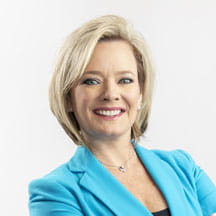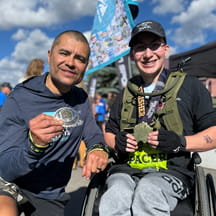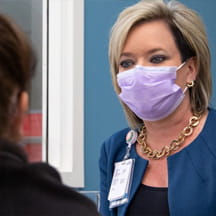
One of the most common questions children hear is, “What do you want to be when you grow up?” Truth be told, I'd never dreamed of being the chief executive officer of a children’s hospital. But as I reflect, it’s powerful to see how my own experience as a child in the health care system set me down my career path, led me to my purpose and informed my leadership style.
As a child, I was in a car accident and had a painful experience in health care, which changed my trajectory and the impact that I was probably always meant to have. After the accident, I never stepped foot in a children’s hospital until many years later as a young professional, and I will never forget it. I went to interview for a position and thought to myself, I have to be here.
My challenging health care experience wasn't about people not doing great work; it was about systems and organizations that didn't help make it easy for them to do great work. I set out wanting to make a difference: to help families better navigate the health care system and to create systems and organizations that allow people to be excellent. Since then, I’ve learned several key lessons that have helped me accelerate that drive for excellence—in myself and others.
1. Make it personal
Having a personal connection to the work I do is essential. Understanding my “why” keeps me anchored, positive and excited about the work I get to do—even, and especially, when it’s hard. From the beginning, my goal has been to have a positive effect on child health, and that drive has led me to take risks and embrace learning opportunities. At every turn, I asked myself if I could make a positive impact and, if the answer was yes, I took a leap. The “why” is not the same for everyone, but it can guide each person to take risks and make a difference.
2. Be authentic
Authenticity is a powerful tool for leaders. Organizations and leaders who encourage authentic behavior are more likely to have engaged and motivated teams. Growing up, I did not see examples of leaders being vulnerable, empathetic and authentic. Those were not seen as leadership competencies, and there was a time when they were considered weaknesses, especially for women. When I was a child in the health care system, I wish I would have seen leaders who genuinely cared. I’m proud to say that compassion is one of the main characteristics of Children’s Hospital & Medical Center.
3. Focus on the toolkit, not the title
I believe that everyone is a leader, and they lead from the role they’re in. Every role is important because what we do in health care is a team sport. My dad, who was an entrepreneur, taught me never to chase the title, but to chase the skills in the job to build the kind of professional toolkit you want. For me, getting rid of the idea of chasing a title was empowering, and it enabled me to focus on acquiring the knowledge and skills I needed to make the biggest impact.
4. Chase progress, not perfection
Excellence is constantly striving to be better than we are now. If leaders are standing still, they’re falling behind, because health care changes so quickly. I recommend leaders find a coach, peer or mentor who can help identify areas of growth and how to leverage strengths for action. Leaders should also surround themselves with people who offer strengths where they are weak. None of us is built to have all the leadership competencies, and we all bring something different to the table. I’m not afraid to say I’m not great at everything, and for me that’s been one of the most powerful leadership lessons I’ve learned.
5. Never stop learning
Keeping my heart and mind open to new lessons, ideas and perspectives only makes me a stronger leader. If I’m the smartest person at the table, I want a new table. I strive to surround myself with smart, talented people who can help me sharpen my knowledge and skills. Humility is mission-critical for successful leadership, and it’s important to recognize I’m still on this journey and have never “landed.” I love running into people and walking away with newfound inspiration. Leaders should be learning from their own experiences and outcomes, too. By committing to being a lifelong learner, leaders allow themselves limitless knowledge and opportunities.



